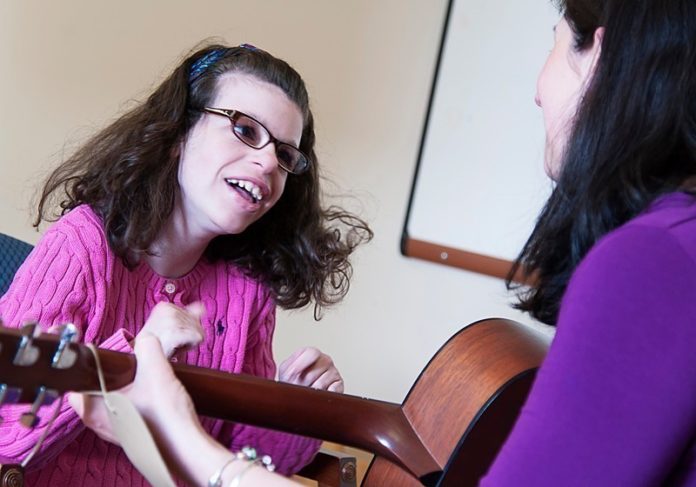
Maddie Manglass learned to wash her hands through a collaboration between her music therapist and her occupational therapist.
“That’s something we worked on for years,” said Carol Manglass, Maddie’s mother. Maddie has Williams Syndrome, a rare genetic condition that causes developmental delays, which in her case, caused her to have limited verbal abilities. Ten years ago, when Maddie was 4 years old, she started working with music therapist Nicole O’Malley, owner of Hands in Harmony in South Kingstown.
There are currently no degree-granting programs for music therapists in Rhode Island, said O’Malley, who earned a bachelor’s degree in the specialty at Anna College in Paxton, Mass., near Worcester, and is working toward a master’s degree through a continuing-education program at Colorado State University, which is the headquarters of the Academy of Neurologic Music Therapy.
State lawmakers are considering a bill this year requiring certified music therapists to register with the state.
Music therapy helped Maddie Manglass by serving as a cue for her to wash her hands.
“Nicole recorded a song for Maddie and the occupational therapist would play it. That motivated Maddie,” said her mother.
“That was just accomplished last year,” O’Malley said of the hand washing, which was learned through a song Maddie helped write with her iPad and approximate vocalizations of the words she wanted to use.
Maddie has also learned simple addition and subtraction and other math with the help of music therapy, says her mother.
“I was there. I watched her choose the correct numbers,” said Manglass. “It’s not about a musical goal. It’s about functional and academic goals. Nicole has been able to work on goals in Maddie’s IEP.” That’s the Individualized Education Program schools have to develop for students with disabilities, mandated by the federal Individuals with Disabilities Education Act.
“I work with the educational team. That way we’re consistent in the words we use and the prompts,” said O’Malley, who is chair of the Rhode Island Music Therapy Task Force, formed in 2012 to increase awareness of the specialty, as well as improve access to the therapy.
Certification is through the U.S. Certification Board for Music Therapists, and the proposed registration would be of professionals who have been certified by that board.
“Music therapy is the specialized use of music by a credentialed professional who develops individualized treatment and supportive interventions for people of all ages and ability levels to address their social, communication, emotional, physical, cognitive, sensory and spiritual needs,” according to the CBMT website.
The House bill was proposed by Rep. Joseph M. McNamara, D-Warwick, who said in a March 12 press release that, “People want to know they’re in the care of a professional, so they can get the most benefit from the treatment. This bill will help people identify professional therapists and would also help therapists boost their own reputations.”
Training to be a certified music therapist includes proficiency in many musical instruments, client assessment, medical terminology, psychology and educational and clinical needs of schools, medical facilities and other community settings.
Rhode Island has nine music therapists who are members of the American Music Therapy Association, said Al Bumanis, spokesman for the Silver Spring, Md.-based organization. The Ocean State had five music therapists in 1994.
O’Malley, who is a neurologic music therapist, is advocating for passage of the state registration because she’s found that many people don’t realize that a music program at a school or nursing home is not music therapy.
“Many of the clients have significant medical needs or neurologic conditions,” said O’Malley.
The power of music is used in music therapy at the Rhode Island Philharmonic.
“We’ve noticed an increase in demand, but we don’t have the music therapists to keep up with the demand,” said Annette Mozzoni, director of education and music school at the R.I. Philharmonic.
“It’s a therapeutic intervention and most of the parents who seek out us out for music therapy have children who have cognitive or intellectual challenges, some on the autism spectrum,” said Mozzoni.
Students range from 3 years old to their early 20s.
The challenge in adding more music therapists is that the philharmonic is not hiring any full time, so with no training programs in the state, it’s difficult to get a certified therapist to move to Rhode Island for a part-time job, she said.
Crystal King is a board-certified neurologic music therapist who lives in Norton and works with students at the philharmonic on Thursday afternoons.
She would like to see the General Assembly pass the bill to require registration of certified music therapists.
“In addition to my degree and board certification, I’m on a five-year track for continuing education. We have to show proof that we know the current research,” said King. “It concerns me that some people might think something is music therapy when it’s not based in science and research with the continuing-education piece.”
One of King’s students is 16-year-old Nicholas Parrillo of Warwick.
“Nicholas is blind and autistic and mostly nonverbal. He goes to Perkins School for the Blind,” said his mother, Kara Parrillo. “When he started working with Crystal at the philharmonic, it was hard for him to even sit still. She just stuck with it and formed a rapport with him. She collaborates with his speech therapist.
“The first breakthrough was ‘This Little Light of Mine’ and he built on that,” said Parrillo. “Now he sings the ABC’s. He knows all the children’s songs. He remembers the words and the tunes.
“He doesn’t really play with other children, so being able to play the keyboard parallel with Crystal is really important,” she said. •











